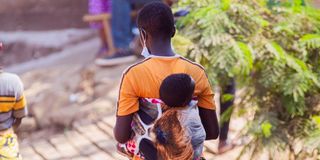Confronting child marriage

A teenage mother with her baby.
What you need to know:
- Poverty, cultural beliefs, lack of education and weak enforcement of laws contribute to the persistence of these practices.
- Many are subjected to domestic violence, suffer poor health outcomes and face a lifetime of poverty and dependence.
Child marriage and teenage pregnancy continue to rob thousands of girls across Kenya of their potential. These practices are not only violations of human rights, but also forms of gender-based violence (GBV) with long-term consequences for adolescent girls.
Despite progressive policies and ongoing advocacy, many girls are still forced into early unions or become mothers while barely out of childhood. In most cases, poverty, cultural beliefs, lack of education and weak enforcement of laws contribute to the persistence of these practices.
Teenage pregnancy and child marriage deny girls the right to education and economic empowerment. Once a girl is married or becomes pregnant, her chances of returning to school decrease significantly. Many are subjected to domestic violence, suffer poor health outcomes and face a lifetime of poverty and dependence. The ripple effects are felt by entire communities and future generations.
Raise awareness
Education remains the most powerful tool in reversing this trend. When girls are supported to stay in school, they are more likely to delay marriage and childbirth, make informed choices and contribute meaningfully to society. The government’s back to school policy is an important step towards giving adolescent mothers and survivors of child marriage a second chance at education, but implementation remains a major hurdle, especially in rural areas.
To change this, communities must be actively engaged in identifying and challenging the norms that perpetuate early marriage and pregnancy.
Encouragingly, non-State organisations are working at the grassroots level to raise awareness and promote accountability. This kind of community-driven action must be scaled up.
Ending child marriage and teenage pregnancy is not just about protecting the rights of girls—it is also about shaping a stronger, more just and equitable society for all.
The writer is an anti-GBV advocate and a communications coordinator at International Solidarity Foundation


